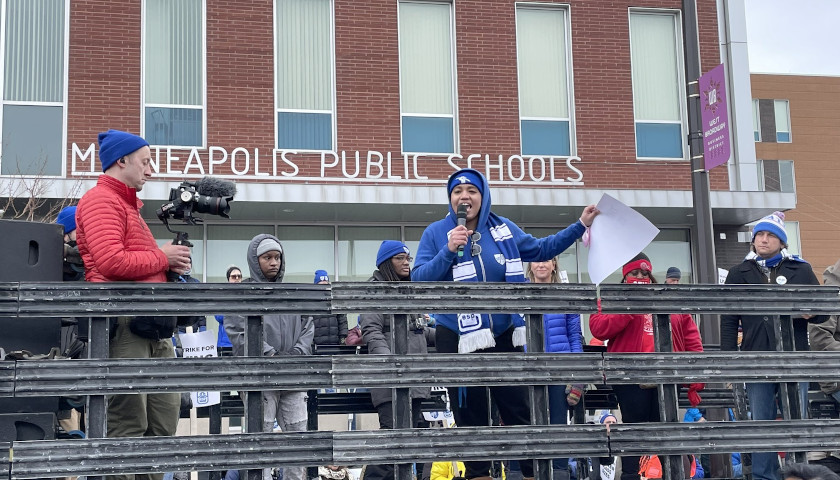by Anthony Gockowski
Minneapolis teachers are officially on strike, resulting in canceled classes for more than 28,000 students.
The Minneapolis Federation of Teachers announced the strike Monday evening after failing to reach a contract agreement with district leaders. The union voted to authorize the strike in late February, which was followed by a 10-day cooling-off period.
“We have continued to do so much more with so much less. Those at the top of this district continue to hoard power and do so much less with so much more,” said Greta Callahan, president of the teachers union, at a press conference Monday.
Callahan made it clear that she wants public schools to get a share of the state’s budget surplus, saying the projected $9 billion surplus represents “over 9 billion reasons why we need to be on that picket line tomorrow.”
Teachers and supporters began picketing Tuesday morning at 7:30 a.m., marking the first teachers strike in Minneapolis in more than 50 years.
The district announced Monday night that all classes would be canceled beginning Tuesday, noting that schools will remain closed “for the duration of the strike.”
“MPS will remain at the mediation table non-stop in an effort to reduce the length and impact of this strike,” the district said.
Critics of the strike have pointed out that Minneapolis teachers earn an average salary of $75,000 per year, but union leaders say they are picketing because of the dismal wages for support staff.
They would like the district to raise starting pay for support staff to $35,000 per year, increase “mental health supports,” and reduce class sizes. Union bosses also want a recruitment and retention plan for “educators of color” and a COVID-19 safety plan, among other demands.
District leaders warned about a rise in teacher absences earlier this year, saying an average of 200 to 300 teachers were missing school each day. According to the union, “640 educators” have left the district in the last 18 months.
Meanwhile, enrollment has continued to plummet, both statewide and in Minneapolis, which is down 13% from 2019. This has resulted in a decrease in state funding, causing a $58 million budget shortfall.
But the district has received $159.4 million in federal American Rescue Plan funds and has used some of that money to fill budget gaps. Even still, the district expects to face budget deficits in future fiscal years.
“If we don’t intervene, we believe the Minneapolis Public Schools will cease to exist,” said Callahan.
St. Paul schools are facing similar challenges but managed to avoid a strike after union and district leaders reached a tentative agreement Monday night.
The National Right to Work Legal Defense Foundation sent a letter to Minneapolis teachers this week, informing them of their right to refuse to participate in the strike.
“Minneapolis and St. Paul educators should know they unequivocally have the right to reject union boss strike orders and continue working to make sure their pupils do not fall behind,” said President Mark Mix. “The last two years showed some particularly aggressive politicking by top teacher union bosses across the country, especially AFT President Randi Weingarten, which resulted in long-running, heavy-handed restrictions on public education. With that in mind, public school employees are right to question whether this strike is really what is best for the Twin Cities’ kids, teachers, and community at large.”
– – –
Anthony Gockowski is Editor-in-Chief of Alpha News. He previously worked as an editor for The Minnesota Sun and Campus Reform, and reported for The Daily Caller.
Photo “Minneapolis Teacher Strike” by AFT.








